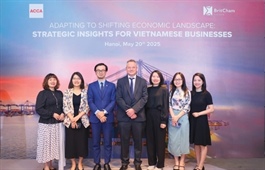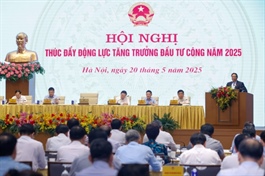Resolution 68: Unlocking Vietnam’s private sector
Resolution 68: Unlocking Vietnam’s private sector
A new, sweeping policy directive could mark the most significant shift in the country’s economic orientation since the economic reforms of the 1980s. Richard D. McClellan, founder of RMAC Advisory, has a look at Vietnam's bold vision for private sector development, foreign investment, and more.
Vietnam's leaders have formally declared the private sector “the most important driver of the economy”, positioning it not as a supplement to state-led growth, but as the leading force behind innovation, technology, and national development, reflecting the reality on the ground.

Richard D. McClellan, founder of RMAC Advisory (source: linkedin/Rich McClellan) |
Resolution No.68-NQ/TW (Resolution 68) is not merely symbolic. It contains actionable commitments that, if implemented effectively, will have a profound and catalytic impact on foreign direct investment (FDI) and foreign indirect investment (FII) into Vietnam. The message to global investors is clear: Vietnam is not just open for business, it is redesigning the playing field to elevate private enterprise and integrate more fully into international capital flows.
At its core, Resolution 68 establishes a new social contract between the state and the business community. It calls for a level playing field across all sectors, equal access to land and capital, clearer and more consistent regulation, and comprehensive legal reforms to reduce administrative friction and increase investor trust.
The resolution sets ambitious benchmarks. Vietnam aims to quickly reduce compliance costs and administrative delays by 30 per cent. By 2030, it targets over two million active private businesses (currently 940,000) contributing 55-58 per cent of national GDP (up from roughly 50 per cent today).
These aren’t merely aspirational targets, they are signals to both domestic and foreign investors that Vietnam intends to formalise its shift from a state-dominant model to a rules-based, enterprise-led growth engine.
Resolution 68 also incorporates a clear commitment to sustainability and innovation. It calls for alignment with environmental, social, and governance (ESG) principles, increased support for startups and small- and medium-sized enterprises, and a digital-first approach to state services. These themes resonate with global investment criteria, particularly for institutional and impact-focused capital.
Investment implications
For foreign direct investors, Resolution 68 opens a new chapter in how Vietnam is perceived and engaged as a destination for long-term capital.
First, the resolution addresses a long-standing challenge: the implicit hierarchy between private and state-owned enterprises (SOEs). By explicitly positioning private businesses as central to national development, the resolution signals a shift towards policy neutrality, an essential condition for attracting sustained FDI.
Second, the emphasis on legal clarity, transparency, and reduced bureaucracy aligns directly with investor needs. The move from pre-approval licensing to post-audit supervision, if applied consistently across provinces, will reduce time-to-market, lower overhead, and allow for more agile operational models. Global firms that once viewed Vietnam as high-potential, but administratively complex, may now revisit expansion plans with greater confidence.
Third, sector-specific implications are highly positive. Resolution 68 highlights the state’s intent to entice investment into high-growth industries where foreign capital and expertise are particularly valuable, renewable energy, high-tech manufacturing, logistics, digital services, and green infrastructure. This opens new avenues beyond Vietnam’s traditional appeal as a low-cost manufacturing base.
Importantly, the resolution also encourages public-private partnerships and outlines a roadmap for increased participation of private firms in sectors historically dominated by the state, such as infrastructure, transport, and utilities. For global infrastructure investors, this could represent a meaningful unlocking of opportunity.
Meanwhile, indirect foreign investment and portfolio flows into Vietnam’s stock and bond markets also stand to benefit significantly from the reforms articulated in Resolution 68.
Capital markets are highly sensitive to policy signals, particularly in emerging markets. The resolution’s emphasis on transparency, governance, and capital market development will resonate with institutional investors who seek long-term growth combined with stability.
Key FII-relevant reforms include of deeper capital markets where the resolution calls for reforms to support initial public offerings, bond issuance, and broader market participation, stronger corporate governance by enhancing disclosure requirements and regulatory modernisation aim to improve investor protections and reduce information asymmetry, and push up SOE equitisation momentum. While this is not new, the resolution’s reiteration of the need to divest and restructure SOEs reopens conversations about liquidity, valuation, and portfolio diversification.
Perhaps most notably, Resolution 68 explicitly references ESG alignment. With sustainability now a core screening criterion for many of the world’s largest asset managers, Vietnam’s alignment with ESG frameworks will enhance its credibility as a destination for responsible capital. This could be especially meaningful for FII flows from Europe, North America, and parts of Asia-Pacific, where regulatory regimes increasingly tie fund allocations to sustainability metrics.
While Resolution 68 sets a bold new course, its true test will be in implementation. For both FDI and FII actors, the coming 12–24 months will be critical for assessing whether the political will is matched by operational follow-through.
Investors will focus on a few key areas. The first is the consistency of enforcement across provinces, as variability in local application of central policy has long been a concern. A business in Ho Chi Minh City should enjoy the same rights and clarity as one in Bac Ninh or Danang, for example.
Second is the land and credit access, as these are the two most sensitive inputs for foreign-invested firms. Will private enterprises, especially joint ventures, see measurable improvements?
The third aspect is the dispute resolution and regulatory recourse. Foreign investors want to know that when problems arise, they will have predictable and fair mechanisms for resolution.
Last but not least, in terms of administrative simplification, are we seeing real reductions in licensing times, inspections, and bureaucratic burden? Will post-audit mechanisms truly be implemented?
If these areas improve measurably, Resolution 68 could serve as a turning point, not just in Vietnam’s domestic reform story, but in its ability to draw in and retain sophisticated foreign capital.
A competitive position
Vietnam is not alone in courting global capital. Indonesia, the Philippines, India, and even Thailand are aggressively reforming to attract FDI and FII. Each country is making its pitch: low costs, abundant labour, digital growth, and political stability.
What gives Vietnam an edge is its rare combination of strong fundamentals and now, a bold top-level political commitment to private sector leadership. Moreover, Vietnam’s proven track record in export manufacturing, its growing digital ecosystem, and its expanding free trade network add additional layers of attractiveness.
Vietnam’s recent show of political will through institutional consolidation, streamlining ministries, reducing administrative units, and signalling governance reform, sends an important signal to the markets. If this momentum is sustained, Vietnam could emerge as Southeast Asia’s most compelling long-term investment story.
Resolution 68, therefore, is not just a reform package. It is a credibility enhancer. It supports the narrative that Vietnam is ready to graduate into a higher class of economy: one that is competitive not just on costs, but on governance, innovation, and institutional strength.
Resolution 68 is many things: a roadmap for private sector growth, a reform mandate for local authorities, and a philosophical pivot in how Vietnam defines its path to prosperity. But for foreign investors, both direct and indirect, it is above all a signal.
It tells the world that Vietnam is ready to evolve its growth model, shift away from over-reliance on state control, and embrace a more dynamic, transparent, and inclusive form of capitalism. It reinforces Vietnam’s reform credibility at a time when global capital is both more cautious and more selective.
For those watching from the sidelines, now may be the time to have a second look, not just at Vietnam’s low-cost appeal, but at its reform momentum and rising institutional confidence.
The private sector is now at the centre of the Vietnamese growth story. And if Resolution 68 is implemented as envisioned, foreign investors will find not only new opportunities, but a new level of trust and long-term alignment.
- 11:12 26/05/2025



























